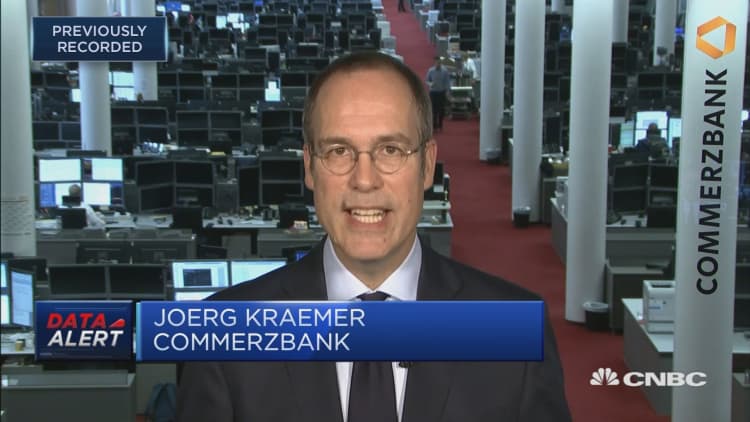The German government is reportedly looking at ways to increase its spending, but analysts are not expecting a fundamental change in a country where a balanced budget has become somewhat of a tradition.
Berlin is considering financing part of its climate protection program with new debt, Reuters reported on Thursday, as part of its policy to help Germany meet its reduction goals for greenhouse gas emissions. This comes as the German government's borrowing costs have hit new lows and some experts predict a recession is on the horizon.
"It is an interesting issue and shows that something is moving. However, in a very German way: very slowly," Carsten Breszki, chief economist at ING Germany, told CNBC via email about the government's plans.
"Reactions from several parties and politicians showed that this debate on letting go of fiscal surpluses and using negative interest rates to actually invest in the future has only just started and is far from being solved," he added.
A balanced budget — one where revenues match or outweigh expenditure — and price stability is a key part of the German psyche who have the memory of hyperinflation in the Weimar Republic in the 1920s.
Without a severe downturn or recession, a huge fiscal package in Germany seems very unlikely.Stefan Kiparsenior economist at BayernLB
Since 2014, the largest European economy has managed to raise public spending without adding new debt — registering a record budget surplus of 58 billion euros ($65 billion) in 2018. However, politicians across the various parties in the Bundestag are wary of using that buffer to spend more due to public opinion.
"While the German government looks set to add funds to manage its energy transition, that Berlin would formally ditch its balanced budget rule for that looks unlikely," Florian Hense, economist at Berenberg, told CNBC via email.
"The number of voices proposing a fiscal stimulus is certainly rising by the day. But for the time being, there is not enough political support for one," he added.
Why consider spending more
Data released over the last six months has led many investors to consider whether Germany is on the brink of a recession. After a slowdown at the end of 2018, Germany saw a modest rebound in the first quarter of 2019, but recent numbers point to a difficult second quarter.

Industrial production, for instance, dropped more than expected in June, data released on Wednesday showed. An escalation in trade tensions between the U.S. and China and the possibility of U.S. car tariffs on Europe have weighed on the economic outlook. A slowdown in Germany would impact the wider performance of the euro zone. As a result, many economists argue that Germany could use its budget surplus to invest more and thus mitigate any slowdown.
"Without a severe downturn or recession, a huge fiscal package in Germany seems very unlikely," Stefan Kipar, senior economist at BayernLB, told CNBC via email.
He added that the German public could accept higher spending if it was linked to climate policies.
"In Germany climate protection is relatively high on peoples' agenda … Therefore, the probability is high that additional spending in times of a deteriorating economic momentum will focus on climate protection in a wider sense," Kipar said. Examples he cited included a "cash for clunkers" program or additional investments in e-mobility infrastructure.
Correction: This story has been updated to correct the period of hyperinflation in the Weimar Republic from 1930s to 1920s.


